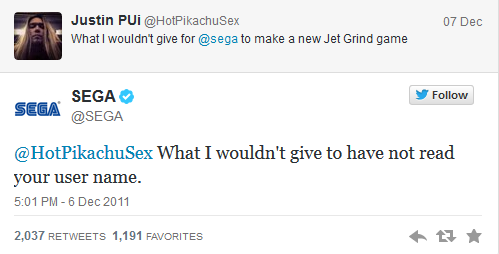Nov
17
2013

Andrew Leong brought up some very important and relatable points in his blog post regarding “Christmas creep,” which is a term describing how companies aim to artificially lengthen the holiday season. I think we’ve all had that moment where, upon hearing the first notes of Christmas carols streaming through the mall way too early or seeing Christmas displays before Halloween, we’ve wanted to give the instigator a piece of our mind. Granted, the statistics show that a good number of people (40%, to be specific) have reported purchasing Christmas presents before Halloween. Looking at social trends, it’s possible that the rationale behind this, for both marketers and consumers, is the social trend revolving around how people nowadays tend to consider themselves extremely busy. But isn’t there a certain point at which Christmas is creeping a bit too close, though? The trend is that it’s been getting pushed earlier and earlier, so a decade or two from now, will we start hearing those sleigh bells jingling in the middle of summer?
That scares me, to be quite honest, but maybe I’m just old-fashioned. Personally, I think that going out of your way to buy gifts months in advance turns a holiday revolving around giving into more of a chore. To put it simply, it detracts from the Christmas spirit. Of course, one could always argue about how rampant consumerism has already destroyed the values of Christmas a long time ago, but that would be digging into a whole new can of worms. The bottom line is that I think holiday advertising should stay where it is, since regardless of whether consumers buy presents sooner or later, they’ll still have to eventually. At the very least, marketers should focus their efforts on that ‘eventually’ for the sake of relevance.
Nov
07
2013

Be funny. It sounds so much easier than it really is, but Tesco Mobile mixes a wonderful sense of humor and witty remarks in what may be the perfect blend. The fact that they’re relatively active, with over 40,000 tweets to date, has probably helped as well. In general, when corporate Twitter accounts reply to consumers, that alone is already enough of a pleasant surprise. Adding in a dash of laughter makes it all the better, as several other companies may have found as a result of their tweets going viral.

Entertaining to read as these tweets always are, there’d been a question in the back of my mind for a while: what was the point? Paying people to sit in front of a computer and come up with sarcastically funny replies to tweets didn’t seem like the best allocation of resources at first glance — but then, I read the following blog post by AdFreak. Although other companies likely have their own goals and focuses when it comes to creative use of social media, the aforementioned post provided an eye-opening, closer look at a specific company’s strategy for social media. To put it simply, they’re employing Twitter to change consumer perceptions of their brand name, something which I feel holds a lot of potential in this time and day. If people find things funny, they’ll probably follow for more. This way, they’re not forcefully shoving their content down the throats of consumers and hoping they’ll react. Instead, people are becoming interested in Tesco’s content of their own free will, which is an amazing use of social media in my opinion.
I’m looking forward to seeing what other strategies we’ll see from other companies in the future if they ever choose to be as open as Tesco was with theirs.
Related Links:
AdFreak: Why Tesco Mobile’s Hilarious Twitter Feed Is Actually No Joke
AdFreak: Is This the World’s Chattiest, Cattiest Corporate Twitter Account?
Mashable: 20 Funny Tweets Your Brand Should Take Seriously
Nov
18
2012

With something as important as investing hundreds of thousands of dollars into a startup company, one would think that an investor looks past things such as a poorly designed logo that could be easily fixed in the future. For example, when writing an essay that isn’t for English class, aren’t the facts more important than the flow or writing style? I know that I’ve lost countless marks due to my tendency to over-embellish points or write in a flowery, fluff-filled manner. Just because someone lacks the skills to make their product look aesthetically pleasing, does that mean the rest of their proposal isn’t worth considering, and that the entrepreneur in question isn’t skilled or passionate about their product?
At the same time, this is a stark reminder of the importance of presentation. Investors likely want to see that you’ve taken the time to refine all aspects of your product before approaching them, and it’s often small things that will be overlooked in a last-minute rush job. So the bottom line is that it’s human nature to be attracted to aesthetically pleasing things — but as shallow as this may sound, investors likely have additional, justifiable reasons for doing so.
Related Links:
Jonathan Hu: Will you be my Angel?
Nov
17
2012

Whether through Facebook, Craigslist, or other sources, the sale of U-Passes is a common occurrence despite TransLink’s constant reminders that such activities are illegal. UBC students pay $30 per month (included in their school fees) for U-Passes and resell them for prices typically ranging between $30-$50. It’s a profitable business, especially for someone who rarely uses public transit. However, few stop to consider what their actions really entail.
The U-Pass program has been criticized on several instances, with a certain blog calling it “the height of fiscal idiocy.” The blog in question also describes how U-Passes are more of a detriment to society than anything else, at least from an economic standpoint. Simply put, TransLink loses at least $15 million per year in exchange for an increase in the number of people utilizing public transit.
Looking at this from a different perspective, rather than that of a student needing some spare change, provides some interesting insight. Is it ethical for students to be profiting from a program already designed to give us a huge benefit out of the pockets of other members of society? It’s certainly something to consider next time before you make that ‘Selling U-Pass!’ post on Facebook.
Nov
12
2012

When faced with ticket sales that refuse to increase, what should a theatre do? Innovate, which is exactly what Cineplex has done by introducing a ‘luxury’ movie experience for adults. After all, finding reasons to increase ticket prices seems to be a logical alternative to increasing ticket sales. This strategy hits home on the main issues that might ward adults away from movie theatres: a lack of time, and a dislike for the rowdy teenage crowd that often frequents said theatres. They’re also the customers who would have the resources to pay extra for such an experience.
However, it could be argued that the current economy will not support such a venture on a large scale, since consumers may be unwilling to spend increased amounts on a regular basis. VIP movies could be a ‘treat’ every once in a while, but it seems unlikely that adults would purchase premium tickets every time they go to the movies.
This is still an innovative idea regardless, and the numbers so far imply its success — so perhaps there is more potential that will be unlocked by Cineplex’s continued expansion into the field with their additional adult-only theatres due in 2014.
Related Links:
Helena Lin: PG-13 is so last year





